Blog
Holidays you can't miss: The 5 most significant national holidays in Vietnam

Please log in to continue

Holidays you can't miss: The 5 most significant national holidays in Vietnam
April 29, 2021
Vietnam, like any other country, has various national holidays to celebrate its history and culture. Vietnamese people follow 2 types of calendars: the solar calendar and the lunar calendar. Thus, there are also 2 types of holidays. Let us guide you through some significant holidays you definitely have to know.
Tet Nguyen Dan is the most important of all holidays of the year. It marks the arrival of the new year according to the lunar calendar. The date changes every year, but it is usually between January and February. During this time, people gather around to relax after a long tiring year of work. They put their worries aside to look forward and begin a new year full of hope.
It is a tradition to return to their homeland for family reunions. They decorate the house together, go shopping for new things and pray for luck in pagodas and temples. Houses are all decorated with trees and flowers such as Dao or Mai. See Vietnamese unique customs such as giving out lucky money to children and burning paper to send to ancestors in the afterlife. Don’t forget to taste the delicious Tet cuisine. There are plenty of traditional dishes such as Chung cake, sticky rice and jam.

Family reunion is an important tradition of Tet Nguyen Dan

A family going to a pagoda to pray for good luck

Dao is the Tet flower in the North
Travel to Vietnam during Tet holidays and you can experience the new year atmosphere in different regions. What’s more, Vietnamese people believe that spring travel can bring good luck for the whole year.
Hung Kings Temple Festival is an annual national event that welcomes a large number of tourists. It is a sacred commemoration of death to honor the merits and sacrifice of Hung Kings. They are the very first kings of Vietnam who, as Vietnamese people believe, founded the nation.
It is based on the myth of Lac Long Quan and Au Co. Long ago, they got married and Au Co gave birth to a membranous sac. The sac got larger and larger and on the seventh day, it burst into 100 eggs. The eggs later turned into 100 beautiful babies. 50 babies went down to the sea with Lac Long Quan while the other half followed their mother to the mountains. Here, the eldest son made himself the king and became the first Hung King. There were 18 Hung Kings throughout the history of Vietnam. Their reign forged many Vietnamese characteristics like a sense of community and patriotism.
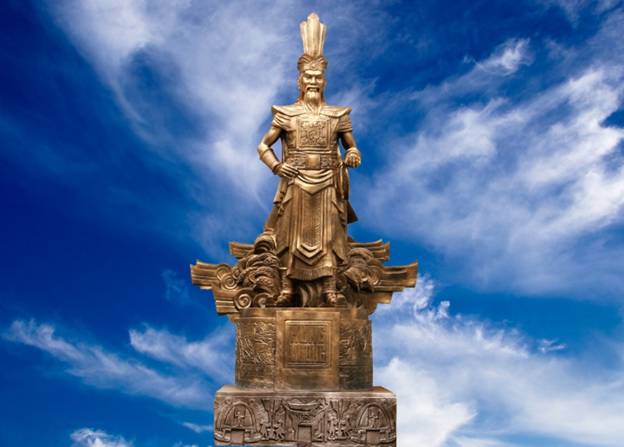
Statue of the mighty Hung King
On the 10th of March every lunar year, citizens from all over Vietnam participate in the Hung Temple on Nghia Linh mountain, Phu Tho. It reminds people that wherever they go, whatever they do, they will always be a part of this community.

Hung Kings Temple Festival attracts many proud citizens of Vietnam every year
New year’s day in Vietnam is just like in any other Southeast Asia country. It is not the main New year’s day so people have less activities than during Tet. However, it is still an important holiday in Vietnam despite originating from the western culture. The New Year’s day has been normalized and become a public holiday in this country. People are allowed to take some days off. The authorities organize some special festivals to celebrate the new year too. Vietnamese people often use this time to go on vacations or simply hang around with friends and family.
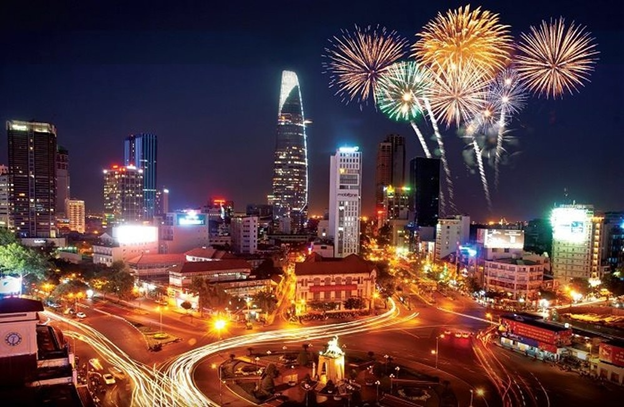
Ho Chi Minh City shooting fireworks to celebrate the New Year’s Day
Vietnamese are all familiar with this holiday. Workers and students get a day off on April 30th, not to mention the International Labor Day following right after. But that’s not the only reason Vietnam's Reunification Day is famous for.
Vietnam's Reunification Day is a very important day to the people here and it has an intriguing historical background. On this day in 1975, everyone burst in tears of happiness as a Vietnamese tank pushed through the gates of the Independence Palace in Saigon . It was the headquarters of the provisional Saigon government. At exactly half past eleven, a soldier raised the Vietnamese flag of victory on the roof of the Independence Palace. This marks the official liberation of the South from American troops, ending the war once and for all.

Vietnamese tank pushing the gates on 30/4/1975
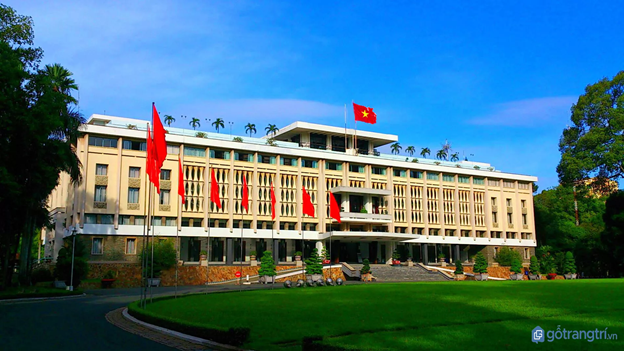
The Independence Palace becomes an important historical site of Vietnam
This holiday creates a sense of pride across the country everywhere. On Vietnam’s Reunification Day, flags, banners and neon lights are in every corner of Vietnam. Many big cities like Hanoi and Ho Chi Minh City even organize national live shows to commemorate this day. However, many people choose to travel during this time and so the cost gets very high.
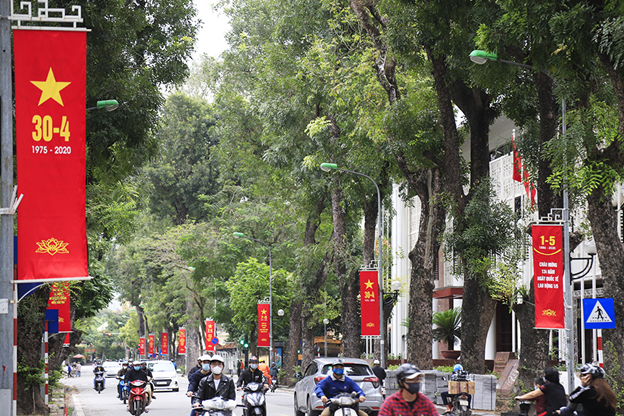
Banners are everywhere on April 30th
National Day, also known as Vietnamese Independence Day, is one of the most significant national holidays to mark on your calendar. Needless to say, this day marks the Vietnamese declaration of independence from the French.
Vietnam was colonized as part of the French Indochina in 1887. Ho Chi Minh later founded the Communist Party of Vietnam and led the people to a glorious victory - the famous August Revolution. Right after that, the revolutionary leader Ho Chi Minh declared Vietnam’s independence from France and announced the establishment of the Democratic Republic of Vietnam.
On this holiday across the country, people raise flags and posters everywhere to commemorate the event. There are speeches from the authorities to the people and there are also beautiful fireworks shows at night. They are often accompanied by live stages in big cities. Not to mention, at Ba Dinh Square there will be grand marches and many festivities. If you are in Hanoi, Da Nang or Ho Chi Minh City, don’t hesitate to go down the streets to join in the cheerful atmosphere of pride and patriotism.
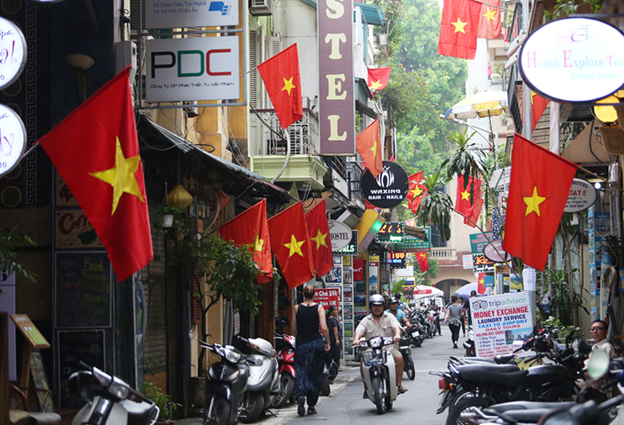
Every house raises flags to celebrate the National Day
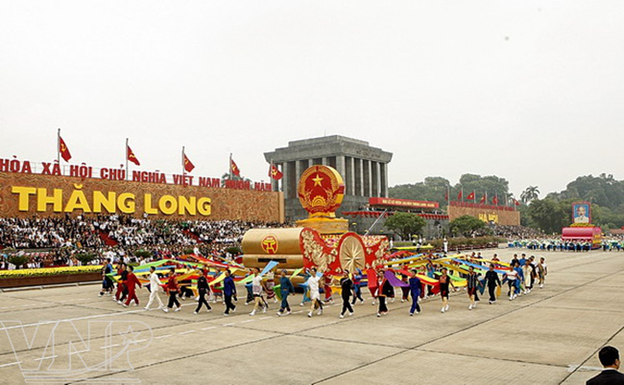
Grand marches are organized at Ba Dinh square
There are many more national holidays that are, despite being less popular, still very important to the Vietnamese beautiful and colorful culture. What’s more, Vietnam has even more festivals that are local. However, these 5 national holidays are the most essential. We hope that by now you have known more about holidays in Vietnam and we wish you a pleasant trip to this wonderful country.